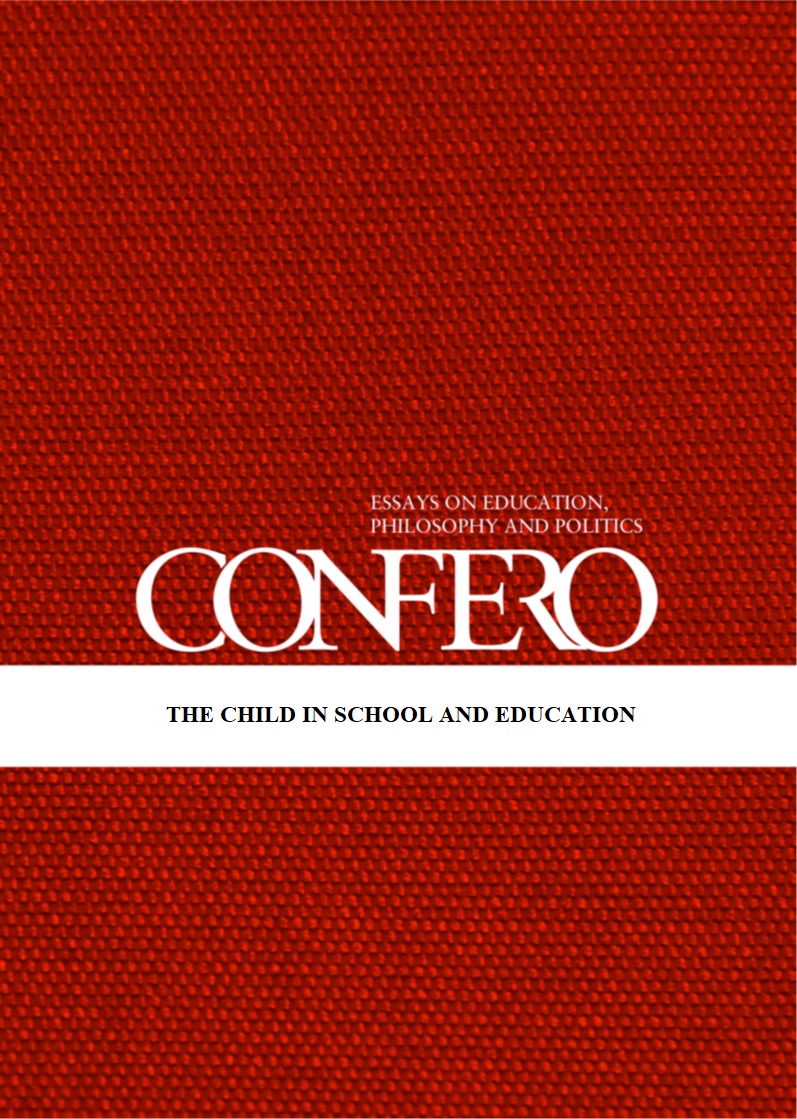Doing and Resisting Pupilness in Swedish School-Age Educare
DOI:
https://doi.org/10.3384/confero.2001-4562.231215Keywords:
Pupilness, Pupil, Student, Children in school, School child, Children in education, Education practice, School-age educare, Fritidshem, Agency, Childhood, Institutional childAbstract
-
References
Ayton, K. (2008). An ordinary school child: Agency and authority in children’s schooling, Linköping University, PhD Dissertation.
Bartholdsson, Å. (2007) Med facit i hand: Normalitet, elevskap och vänlig maktutövning i två svenska skolor. Stockholm University, PhD Dissertation.
Biesta, G. (2009). Good education in an age of measurement: On the need to reconnect with the question of purpose in education. Educational Assessment, Evaluation and Accountability, 21, 33–46. https://doi.org/10.1007/s11092-008-9064-9
Bodén, L. (2016). Present absences: Exploring the posthumanist entanglements of school absenteeism. Linköping university, PhD Dissertation.
Dahl, M. (2014). Fritidspedagogers handlingsrepertoar: Pedagogiskt arbete med barns olika relationer. Linné university, PhD Dissertation.
Denscombe, M. (2012). Classroom control: a sociological perspective. London: Routledge.
Elvstrand, H., & Lago, L. (2019). “You know that we are not able to go to McDonald’s”: Processes of doing participation in the Leisure Time Center. Early Child Development and Care, 189(13), 2156–2166. https://doi.org/10.1080/03004430.2018.1443920
Elvstrand, H., & Lago, L. (2020): Do they have a choice?: Pupils’ choices at LTCs in the intersection between tradition, values and new demands, Education Inquiry, 11(1), 54-68, https://doi.org/10.1080/20004508.2019.1656505
Elvstrand, H., & Närvänen, A-L. (2016). Children’s own perspectives on participation in Leisure-time Centers in Sweden. American Journal of Educational Research, 4(6), 496-503. http://pubs.sciepub.com/education/4/6/10/
Emilson, A. (2008). Det önskvärda barnet: fostran uttryckt i vardagliga kommunikationshandlingar mellan lärare och barn i förskolan. University of Gothenburg, PhD Dissertation.
Haglund, B. (2009). Fritid som diskurs och innehåll: en problematisering av verksamheten vid ›afterschool-programs› och fritidshem. Pedagogisk Forskning i Sverige, 14(1), 22–44.
Hedrén, S., & Lago, L. (2023). Is there an ”I” in ”We”?: Staff’s discursive formations of the child in Swedish School Age Educare. Nordisk tidsskrift for pedagogikk og kritikk, 9. https://doi.org/10.23865/ntpk.v9.5079
Holmberg, L., & Börjesson, M. (2015). Ideological dilemmas in Leisure-time Centers. Nordic Studies in Education, 35(3–4), 313–331.
Jackson, P.W. (1990[1968]). Life in classrooms. New York: Teachers College Press.
Kofoed, J. (2008). Appropriate pupilness: Social categories intersecting in school. Childhood, 15(3), 415–430. https://doi.org/10.1177/0907568208091671
Lager, K. (2018). Att undervisa i fritidshem: omsorg, lärande och utveckling i en helhet. Educare – Vetenskapliga Skrifter, (2), 51–68. https://doi.org/10.24834/educare.2018.2.3
Lager, K. (2021). ”Som kompisar, fast vuxna”: Relationens betydelse för barns aktörskap i fritidshem, Barn – Forskning om barn og barndom i Norden, 39(2-3), 29-45. https://doi.org/10.5324/barn.v39i2–3.3759
Lago, L. (2014). Mellanklass kan man kalla det: Om tid och meningsskapande vid övergången från förskoleklass till årskurs ett. Linköping university, PhD Dissertation.
Lago, L., & Elvstrand, H. (2021). Ett eget utrymme: Barns perspektiv på kontroll i relation till fritidshemmets gränser. Barn – Forskning om barn og barndom i Norden, 39(2-3), 15-28. https://doi.org/10.5324/barn.v39i2–3.3785
Lago, L., & Elvstrand, H. (2022). Children on the borders between institution, home and leisure: Space to fend for yourself when leaving the school-age educare centre. Early Child Development and Care, 193(11), 1715-1727. https://doi.org/10.1080/03004430.2021.1929200
Lahelma, E. & Gordon, T. (1997). First day in secondary school: Learning to be a ‘professional pupil’. Educational Research and Evaluation, 3(2), 119-139. https://doi.org/10.1080/1380361970030202
Lofors-Nyblom, L. (2009). Elevskap och elevskapande: Om formandet av skolans elever. Umeå university, PhD Dissertation.
Löfgren, R., Löfgren, H., & Lindberg, V. (2019). Pupils’ perceptions of grades: a narrative analysis of stories about getting graded for the first time. Assessment in Education: Principles, Policy & Practice, 26(3), 259-277. https://doi.org/10.1080/0969594X.2019.1593104
MacNaughton, G., Hughes, P., & Smith, K. (2007). Young children’s rights and public policy: Practices and possibilities for citizenship in the early years. Children & Society, 21(6), 458-469. https://doi.org/10.1111/j.1099-0860.2007.00096.x
SFS 2010:800 The Swedish education act.
Skolverket (2022). Läroplan för grundskolan, förskoleklassen och fritidshemmet 2022. Skolverket.
Thornberg, R. (2009). The moral construction of the good pupil embedded in school rules. Education, Citizenship and Social Justice, 4(3), 245–261. https://doi.org/10.1177/1746197909340874
Vetenskapsrådet. (2017). God forskningssed [Elektronisk resurs]. Vetenskapsrådet.
Downloads
Published
Issue
Section
License
Copyright (c) 2023 Lina Lago

This work is licensed under a Creative Commons Attribution 4.0 International License.
As Confero is an open access journal, this means that anyone who can access the Internet can freely download and read the journal. There are no commercial interests for Linköping University Electronic Press or Confero in publishing the journal.
The core idea of open access is that copyright remains with the author(s). However, we publish with the agreement of the author that if she or he decides later to publish the article elsewhere, that the publisher will be notified, prior to any acceptance, that the article has already been published by Confero.
When publishing with Confero, it is with the agreement of the author that if they make their article available elsewhere on the internet (for example, on their own website or an institutional website), that they will do so by making a link to the article as published in Confero using the Digital Object Identifier (DOI) number of the article and acknowledge in the text of the site that the article has been previously published in Confero.
As evident by the markers on our homepage, Confero falls under the Creative Commons licence abbreviated BY. This means that we allow others to use, spread and elaborate on the published articles, as long as they acknowledge who published it and where it was originally published.



